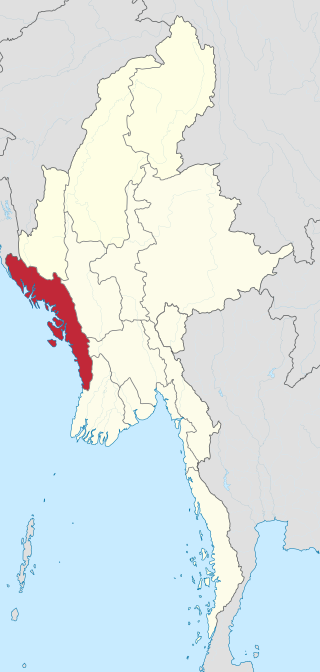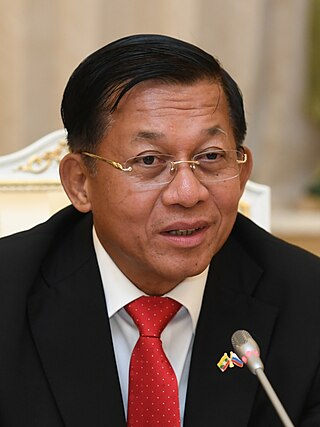Related Research Articles

Rakhine State, formerly known as Arakan State, is a state in Myanmar (Burma). Situated on the western coast, it is bordered by Chin State to the north, Magway Region, Bago Region and Ayeyarwady Region to the east, the Bay of Bengal to the west and the Chittagong Division of Bangladesh to the northwest. It is located approximately between latitudes 17°30' north and 21°30' north and longitudes 92°10' east and 94°50' east. The Arakan Mountains or Rakhine Yoma separated Rakhine State from central Burma from North to South. Off the coast of Rakhine State there are some fairly large islands such as Ramree, Cheduba and Myingun. Rakhine State has an area of 36,762 square kilometres (14,194 sq mi) and its capital is Sittwe.

The Rohingya people are a stateless Indo-Aryan ethnic group who predominantly follow Islam and reside in Rakhine State, Myanmar. Before the Rohingya genocide in 2017, when over 740,000 fled to Bangladesh, an estimated 1.4 million Rohingya lived in Myanmar. Described by journalists and news outlets as one of the most persecuted minorities in the world, the Rohingya are denied citizenship under the 1982 Myanmar nationality law. There are also restrictions on their freedom of movement, access to state education and civil service jobs. The legal conditions faced by the Rohingya in Myanmar have been compared to apartheid by some academics, analysts and political figures, including Nobel laureate Bishop Desmond Tutu, a South African anti-apartheid activist. The most recent mass displacement of Rohingya in 2017 led the International Criminal Court to investigate crimes against humanity, and the International Court of Justice to investigate genocide.

Islam is a minority religion in Myanmar, practised by about 2.1% of the population, according to the 2014 Myanmar official statistics.
There is a history of persecution of Muslims in Myanmar that continues to the present day. Myanmar is a Buddhist majority country, with significant Christian and Muslim minorities. While Muslims served in the government of Prime Minister U Nu (1948–63), the situation changed with the 1962 Burmese coup d'état. While a few continued to serve, most Christians and Muslims were excluded from positions in the government and army. In 1982, the government introduced regulations that denied citizenship to anyone who could not prove Burmese ancestry from before 1823. This disenfranchised many Muslims in Myanmar, even though they had lived in Myanmar for several generations.

Insurgencies have been ongoing in Myanmar since 1948, when the country, then known as Burma, gained independence from the United Kingdom. It has largely been an ethnic conflict, with ethnic armed groups fighting Myanmar's armed forces, the Tatmadaw, for self-determination. Despite numerous ceasefires and the creation of autonomous self-administered zones in 2008, armed groups continue to call for independence, increased autonomy, or federalisation. It is the world's longest ongoing civil war, spanning almost eight decades.
Myanmar (Burma) is a Buddhist majority country with a significant minority of Christians and other groups residing in the country.
Myanmar has been under the rule of repressive authoritarian military regimes since 1962. After the 1974 Socialist constitution was suspended in 1988, constitutional protection of religious freedom has not existed, after the bloody suppression of the 8888 Uprising. The authorities generally permitted most adherents of registered religious groups to worship as they choose; however, the government imposed restrictions on certain religious activities and is accused of abusing the right to freedom of religion.
The 2012 Rakhine State riots were a series of conflicts primarily between ethnic Rakhine Buddhists and Rohingya Muslims in northern Rakhine State, Myanmar, though by October Muslims of all ethnicities had begun to be targeted. The riots started came after weeks of sectarian disputes including a gang rape and murder of a Rakhine woman which police allege was committed by three Rohingya Muslims. On 8 June 2012, Rohingyas started to protest from Friday's prayers in Maungdaw township. More than a dozen residents were killed after police started firing. A state of emergency was declared in Rakhine, allowing the military to participate in administration of the region. As of 22 August 2012, officially there were 88 casualties: 57 Muslims and 31 Buddhists. An estimated 90,000 people were displaced by the violence. Around 2,528 houses were burned; of those, 1,336 belonged to Rohingyas and 1,192 belonged to Rakhines.

The Rohingya conflict is an ongoing conflict in the northern part of Myanmar's Rakhine State, characterised by sectarian violence between the Rohingya Muslim and Rakhine Buddhist communities, a military crackdown on Rohingya civilians by Myanmar's security forces, and militant attacks by Rohingya insurgents in Buthidaung, Maungdaw, and Rathedaung Townships, which border Bangladesh.

Min Aung Hlaing is a Burmese army general who has ruled Myanmar as the chairman of the State Administration Council (SAC) since seizing power in the February 2021 coup d'état. He additionally appointed himself Prime Minister of Myanmar in August 2021, and President in July 2024. He has led the Tatmadaw, an independent branch of government, as the Commander-in-chief of Defence Services since March 2011, when he was handpicked to succeed longtime military ruler Senior General Than Shwe, who transferred leadership over the country to a civilian government upon retiring. Before assuming leadership over the Tatmadaw, Min Aung Hlaing served as Joint Chief of Staff from 2010 to 2011. Min Aung Hlaing is the first Defence Services Academy (DSA) graduate in Myanmar to lead a military coup as well as the first DSA graduate to become Commander-in-Chief of Defence Services.

Major General Twan Mrat Naing, also spelled Tun Myat Naing (Arakanese:ထွန်းမြတ်နိုင်), is an Arakanese revolutionary and commander in chief of the Arakha Army, an ethnic armed organization. Twan Mrat Naing has led the Arakan Army since its founding in 2009, and maintains the rank of Major General. Twan Mrat Naing is of Arakanese descent and resides in Laiza, Kachin State, where the Arakan Army's "temporary headquarters" are.
The following lists events in the year 2017 in Myanmar.

The Rohingya genocide is a series of ongoing persecutions and killings of the Muslim Rohingya people by the military of Myanmar. The genocide has consisted of two phases to date: the first was a military crackdown that occurred from October 2016 to January 2017, and the second has been occurring since August 2017. The crisis forced over a million Rohingya to flee to other countries. Most fled to Bangladesh, resulting in the creation of the world's largest refugee camp, while others escaped to India, Thailand, Malaysia, and other parts of South and Southeast Asia, where they continue to face persecution. Many other countries consider these events ethnic cleansing.

Violent clashes have been ongoing in the northern part of Myanmar's Rakhine State since October 2016. Insurgent attacks by the Arakan Rohingya Salvation Army (ARSA) have led to sectarian violence perpetrated by Myanmar's military and the local Buddhist population against predominantly Muslim Rohingya civilians. The conflict has sparked international outcry and was described as an ethnic cleansing by the United Nations High Commissioner for Human Rights. In August 2017, the situation worsened and hundreds of thousands of refugees fled Myanmar into Bangladesh, with an estimated 500,000 refugees having arrived by 27 September 2017. In January 2019, Arakan Army insurgents raided border police posts in Buthidaung Township, joining the conflict and beginning their military campaign in northern Rakhine State against the Burmese military.
The Advisory Commission on Rakhine State was an international advisory commission headed by former UN Secretary-General Kofi Annan to ensure the social & economical well-being of both the Buddhist and the Rohingya communities of Myanmar's conflict-ravaged Rakhine State. The decision to establish the commission was made on 23 August 2016. The commission was an institution of Myanmar, established in cooperation with the Kofi Annan Foundation, and most members were Myanmar citizens. It became widely known and referred to as the "Annan commission" or the "Rakhine commission."

Inn Din is a village in northern Rakhine State, Myanmar. The village is in an area of mixed ethnicity, including Rohingya and ethnic Rakhine people. In December 2017, a mass grave with ten Rohingya men was discovered near the Inn Din cemetery. In January 2018, the Myanmar military admitted that its soldiers and Rakhine paramilitaries had killed the ten Rohingyas in September of the previous year.

The Inn Din massacre was a mass execution of Rohingyas by the Myanmar Army and armed Rakhine locals in the village of Inn Din, in Rakhine State, Myanmar on 2 September 2017. The victims were accused of being members of the Arakan Rohingya Salvation Army (ARSA) by authorities. An investigation by Myanmar's military concluded on 10 January 2018 that there was indeed a mass execution of Rohingyas in Inn Din, marking the first instance where the military admitted to extrajudicial killings during their "clearance operations" in the region.

U Kyaw Hla Aung was a Burmese lawyer and civil rights activist and member of the Rohingya community.

Ma Nyein Thaw Mee is a 2002 Burmese drama film, directed by Naung Htun Lwin and Nyi Nyi Htun Lwin starring Dwe, Moht Moht Myint Aung, Nandar Hlaing, Nay Aung and Cho Pyone.
Events in the year 2022 in Myanmar.
References
- ↑ "POV Announces the Acquisition of Midwives, Debut Feature of Snow Hnin Ei Hlaing". pbs.org. Retrieved 2024-08-01.
- 1 2 3 Gharib, Malaka (28 January 2022). "Sundance prize goes to 'Midwives' — about a Buddhist midwife and her Muslim apprentice". NPR . Retrieved 29 January 2022.
- ↑ "Midwives". Rotten Tomatoes . Retrieved 13 November 2022.
- ↑ Bradshaw, Peter (28 September 2022). "Midwives review – a Muslim and a Buddhist grapple with childbirth in strife-torn Myanmar". The Guardian . Retrieved 13 November 2022.
- ↑ Hughes, David (30 September 2022). "Midwives review: Hope conquers hate in a Myanmar maternity clinic". Time Out. Retrieved 13 November 2022.
- ↑ Galuppo, Mia (29 January 2022). "Sundance: 'Nanny' and 'The Exiles' Take Top Prizes at 2022 Fest". The Hollywood Reporter . Retrieved 29 January 2022.